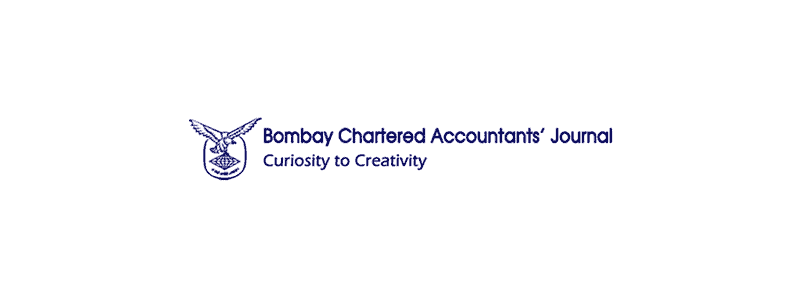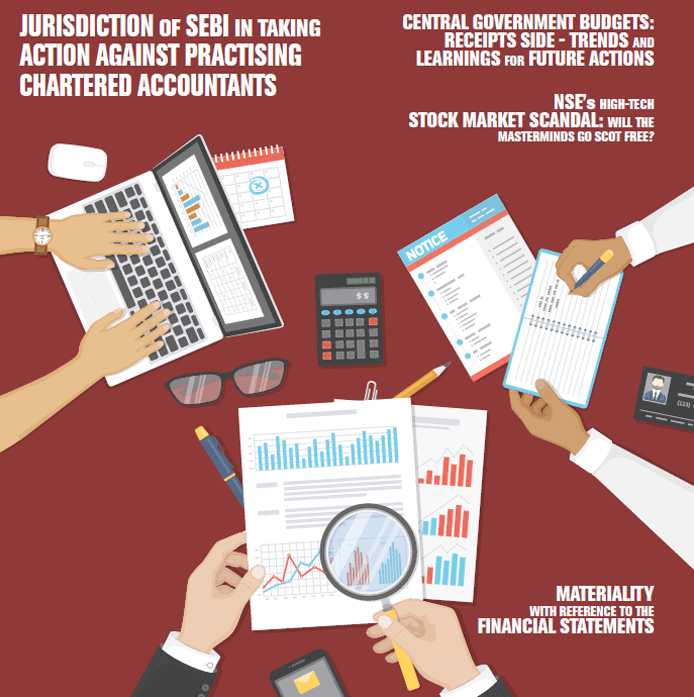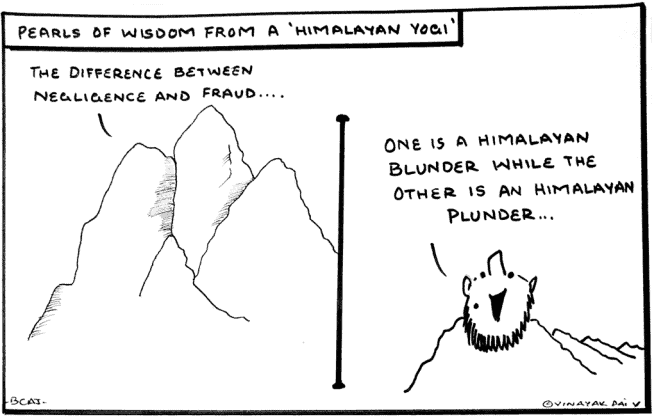

Jurisdiction of sebi in taking action against practising chartered accountants
ROBIN SHAH, Advocate
Background
With the onset of the infamous Satyam scam of 2008- 2009, where major accounting frauds were exposed, SEBI initiated a detailed investigation of the books of accounts of Satyam. Post investigation, SEBI issued a Show Cause Notice to the statutory auditor of Satyam, namely Price Waterhouse Co. (PWC). The power of SEBI to issue such a Show Cause Notice to a Chartered Accountant (firm) was challenged by PWC before the Hon’ble Bombay High Court (Writ Petition No. 5249 of 2010) under Article 226 of the Constitution. The Hon’ble Bombay High Court (vide its order of 13th August 2010) put the controversy to rest by allowing SEBI to initiate action and bring Chartered Accountants within its fold – subject to not encroaching on the ICAI’s powers under the Chartered Accountants Act, 1949 (CA Act).
The Hon’ble Bombay High Court emphasized the fact that only if the Chartered Accountant was involved in the falsification and fabrication of books of a listed company, then SEBI could invoke its powers under Section 11(4) r.w.s. 11B of the SEBI Act, which reads as under:
Section 11B.
(1) Save as otherwise provided in section 11, if after making or causing to be made an inquiry, the Board is satisfied that it is necessary:
(i) in the interest of investors, or orderly development of securities market; or
(ii) to prevent the affairs of any intermediary or other persons referred to in section 12 from being conducted in a manner detrimental to the interest of investors or the securities market, or to secure the proper management of any such intermediary or person.
it may issue such directions:
(a) to any person or class of persons referred to in section, or associated with the securities market; or
(b) to any company in respect of matters specified in section 11A, as may be appropriate in the interests of investors in securities and the securities market.
An important facet of the aforesaid definition is whether an auditor of listed companies (and registered intermediaries) can be considered to be a ‘person associated with the securities market’ and thereby under the jurisdiction of SEBI. The Hon’ble Bombay High Court clarified that if SEBI concludes that there was no ‘men’s rea or connivance’ to fabricate and fudge the books of accounts, then SEBI ought not to issue any direction(s) against the auditor.
Within the aforesaid contours, the proceedings (qua PWC) continued at the SEBI level and finally concluded with an Order against PWC (on 10th January 2018), inter-alia, imposing a restraint on PWC on issuing a certificate to a listed company for two years, amongst other directions. PWC challenged the SEBI Order before the Hon’ble Securities Appellate Tribunal (SAT). In the said case (decided on 9th September 2019), the Hon’ble SAT went into the question as to whether SEBI could have proceeded against an auditor in connection with the work which they had undertaken for a listed company in respect of maintaining its books of accounts. After deliberation, the Hon’ble SAT ruled that SEBI’s inquiry ought to be only restricted to the charge of conspiracy and involvement in ‘fraud’. SEBI cannot take action against the auditing firm on the charge of professional negligence – since the CA firm was under the jurisdiction of ICAI. The said SAT Order has been challenged by SEBI before the Hon’ble Supreme Court – in which the regulator obtained a limited stay in its favor (Supreme Court Order dated 18th November 2019 in Civil Appeal No(s). 8567-8570/ 2019). Until the Hon’ble Supreme Court finally adjudicates the matter – the question of SEBI’s jurisdiction of taking action against the Chartered Accountant(s) remains an open-ended one.
However, in the recent past, SEBI has been penalizing auditors of listed companies and registered intermediaries in respect of their auditing functions by alleging that the concerned auditor had violated Sections 12A(a), 12A(b), and 12A(c) of the SEBI Act, which reads as under
12A. No person shall directly or indirectly:
(a) use or employ, in connection with the issue, purchase, or sale of any securities listed or proposed to be listed on a recognized stock exchange, any manipulative or deceptive device or contrivance in contravention of the provisions of this Act or the rules or the regulations made thereunder;
(b) employ any device, scheme, or artifice to defraud in connection with the issue or dealing in securities that are listed or proposed to be listed on a recognized stock exchange;
(c) engage in any act, practice, course of business which operates or would operate as fraud or deceit upon any person, in connection with the issue, dealing in securities which are listed or proposed to be listed on a recognized stock exchange, in contravention of the provisions of this Act or the rules or the regulations made thereunder.
RECENT RULING BY HON’BLE SAT
Through recent decisions in the M. V. Damania case (Appeal No. 335 of 2020 decided on 17th January 2022) and Mani Oommen case (Appeal No. 183 of 2020 decided on 18th February 2022); the Hon’ble SAT has set aside the SEBI orders penalizing the auditors:
I. In the M. V. Damania case, the concerned auditor had certified the expenditure incurred by Paramount Printpackaging Ltd (PPL) towards Initial Public Offering (IPO) expenses out of the IPO proceeds. The crux of SEBI’s allegation was that the auditor negligently certified that an amount of Rs. 36.60 crores was utilized towards objects of the IPO. SEBI had alleged that:
(i) PPL made payment to the various vendors in crore of rupees without having any invoices;
(ii) in some cases, bills from the vendors were issued at a later date, post remittance by PPL; and
(iii) the auditor did not raise any red flag against doubtful payments made by PPL.
In view of the aforesaid, SEBI imposed a monetary penalty of Rs. 15 lakhs on the auditor firm (and its partner), jointly and severally, for alleged violation of provisions of Section 12A(a), 12A(b) and 12A(c) of the SEBI Act r.w. Regulations 3 and 4 of the SEBI (Prohibition of Fraudulent and Unfair Trade Practices relating to Securities Market) Regulations, 2003 (PFUTP Regulations).
In Appeal, the concerned auditor contended the following, amongst other arguments:
(i) audit of the financial statements of PPL was based on the information provided by the management;
(ii) in the process of the audit, the endeavour was to obtain audit evidence that is sufficient and appropriate to provide a basis for forming an independent opinion;
(iii) all the payments made by PPL were supported by bank statements; and
(iv) in any case, SEBI had no jurisdiction to proceed against Chartered Accountants, who are members of the ICAI.
The Hon’ble SAT ruled that the provisions of Section 12A(a) and 12A(b) of the SEBI Act do not apply to Chartered Accountants since ‘they are not dealing in the securities. Similarly, the provisions of Section 12A(c) cannot be made applicable because the concerned auditor has carried out no ‘fraud’. Most importantly, the Hon’ble SAT ruled that in the absence of connivance, deceit, or manipulation by the auditor, the provisions of Regulations 3 and 4 of the PFUTP Regulations cannot be made applicable. Consequently, the SEBI Order was set aside.
II. In the Mani Oommen case, SEBI alleged that DCHL (a listed company) had understated its outstanding loans to the tune of Rs. 1,339.17 crores in 2008-09 and wrongly disclosed the difference between the actual and reported outstanding loans for 2009-10 and 2010-11. Also, its promoters, the owner of the Deccan Chronicle Marketers (DCM) had wrongly transferred loans on the last day of the financial year and reversed them on the first day of the next financial year. SEBI had alleged that:
(i) As per Sections 224 and 227 of the Companies Act, 1956, an auditor owes an obligation to the shareholders to report true and correct facts about the company’s financials, and the auditor was duty-bound to report correct facts under Section 227 of the Companies Act.
(ii) SEBI opined that the concerned auditor overlooked the reporting of the outstanding loans, and he was not diligent in his obligation to check outstanding loan details from the bank and other independent sources.
In view of the aforesaid, SEBI held that the auditor did not adhere to the Auditing and Assurance Standard – 5 (AAS) prescribed by ICAI. SEBI alleged that the concerned auditor had violated the provisions of Section 12A(a) and 12A(b) of the SEBI Act r.w. Regulations 3 and 4 of the PFUTP Regulations. Consequently, SEBI penalized the said auditor and prohibited him from issuing any certificate of audit and rendering any auditing services to any listed companies and registered intermediaries for one year. Additionally, SEBI directed listed companies and intermediaries registered with SEBI not to engage any audit firm associated with the said auditor in any capacity for issuing any certificate w.r.t compliance of statutory obligations, which SEBI is competent to administer and enforce.
In Appeal, the concerned auditor contended the following, amongst other arguments:
(i) as a statutory auditor, the responsibility was to express an opinion on the financial statement based on the internal audit;
(ii) the auditor was not involved in the preparation of the books of accounts of the company, and
(iii) the accounting adjustment, namely non-disclosure of the loans by transferring the same to another entity was brought to his notice for the first time during an audit of the books of accounts of DCHL in October-2012 (at a later point in time).
The Hon’ble SAT ruled that, in the entire SEBI Order, there is no finding that the concerned auditor was instrumental in preparing false and fabricated accounts or has connived in the falsification of the books of account. The only finding by SEBI was that due diligence was not carried out by the said auditor. There was no finding (by SEBI) that the auditor had manipulated the books of accounts with knowledge and intention, in the absence of which, there is no deceit or inducement by the auditor. In the absence of any inducement, the question of fraud committed by the auditor does not arise. Consequently, the SEBI Order was set aside.
FRAUD VIS-À-VIS NEGLIGENCE
It is clear from the aforesaid rulings of the Hon’ble SAT that lack of due diligence can only lead to professional negligence, which would amount to misconduct – which could be under the purview of other regulators (like ICAI / NFRA). While the much-needed clarity on the jurisdiction of the SEBI vis-à-vis auditors is being awaited from the Hon’ble Supreme Court, the Chartered Accountant(s) must bear in mind that presently SEBI can act against them – if found that there was an element of ‘fraud’ while auditing listed companies and regulated intermediaries.
The Regulation 2 (c) of PFUTP Regulations defines the term ‘fraud’ in two parts:
(i) First part includes any act, expression, omission, or concealment committed whether in a deceitful manner or not by a person or by any other person with his connivance or by his agent while dealing in securities in order to induce another person or his agent to deal in securities, whether or not there is any wrongful gain or avoidance of any loss; and
(ii) The second part includes specific instances which may tantamount to be fraudulent.
In the Kanaiyalal Baldevbhai Patel case (2017 15 SCC 1 – decided on 20th September 2017), the Hon’ble Supreme Court has ruled that the term ‘fraud’ under the PFUTP Regulations is an act or an omission (even without deceit) if such an act or omission had the effect of ‘inducing’ another person to ‘deal in securities’.
The term ‘negligence’ as quoted in the PWC Order (SAT Appeal No. 6 of 2018) means the failure to use such care as a reasonably prudent and careful person would use under similar circumstances; it is the doing of some act which a person of ordinary prudence would not have done under similar circumstances or the failure to do which a person of ordinary prudence would have done under similar circumstances (Black’s Law Dictionary, 6th edition).
RISK OF REGULATORY OVERREACH
The regulatory overlaps between SEBI and other regulators in the financial services space have been an ongoing issue. With SEBI having powers under the Securities and Exchange Board of India Act, 1992 (SEBI Act), there arises a situation where SEBI exercises jurisdiction against all persons on the ground that they are ‘associated with the securities market’. Consequently, the casualties are usually the regulated entities and the professionals who advise them on lawfully navigating this complex regulatory space. In the past, there have been instances of such regulatory overlaps of SEBI with the Insolvency and Bankruptcy Board of India (IBBI), Competition Commission of India (CCI), and Reserve Bank of India (RBI), Central Electricity Regulatory Commission (CERC), etc.
One cannot deny that the SEBI is an apex regulator when it comes to protecting the sanctity of the securities market and, in fact, has been armed with powers to protect the interest of investors. If the regulator demonstrates that an auditor was involved in fabricating and fudging the financial statements or had ‘colluded’ with the listed company/promoters, a charge of fraud can be fastened. However, the question is whether SEBI ought to adjudicate on issues pertaining to the professional conduct of practicing Chartered Accountant(s). At the end of the day, the bible for Chartered Accountants is the auditing standards – which are prepared and deliberated upon by the ICAI. The hazard of over-regulation may result in moving away from a solution-oriented regime and create a situation where every audit report will carry more caveats than it already carries. There is a thin line between a ‘fraudulent’ and ‘negligent’ act, to avoid anomaly, inter-agency coordination is desirable.
THE WAY FORWARD
In October 2010, the central government constituted the Financial Stability and Development Council (FSDC) – an apex regulatory Council to resolve regulatory overlaps. FSDC’s role is to enhance inter-regulatory coordination and promote financial sector development. The Chairman of the Council is the Finance Minister, and its members include the heads of financial sector Regulators (RBI, SEBI, PFRDA, IRDA, etc.), Finance Secretary and/or Secretary, Department of Economic Affairs, Secretary, Department of Financial Services, and the Chief Economic Adviser. The Council is empowered to invite experts to its meetings as and when required.
FSDC may consider inviting representatives from the ICAI and NFRA for inter-regulatory coordination to resolve the regulatory overlap.

